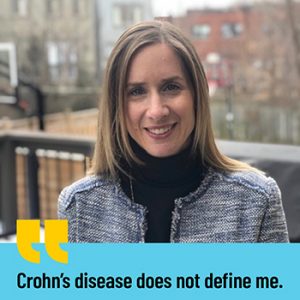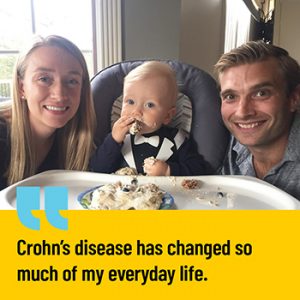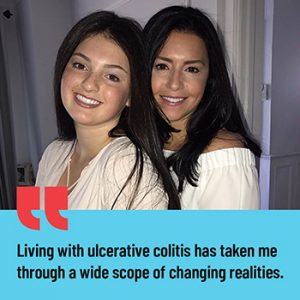As part of our spotlight on Inflammatory Bowel Disease (IBD) this month, we asked some of our patients to share what it’s like to live with these conditions, which include Crohn’s disease and ulcerative colitis.
We spoke with Stacey, Steve and Raquel to find out how IBD has impacted their lives and families.
 Stacey Gitlin: “I have lived with Crohn’s disease for almost 23 years. During this time, there have been many flare ups, medications, surgeries, and a constant struggle and desire to maintain a “normal” life. I often think it should be easier to manage by now and in some ways it is. I can now identify many of my triggers be it food, season or stress levels. However, it is still the unpredictable nature of this disease that truly makes it challenging and frustrating at times. Crohn’s does not define me, but there is not a day that goes by where Crohn’s does not enter my mind; it affects my food choices, energy levels, even my travel destinations. In spite of all these daily challenges, I am proud to say that I live a very full life surrounded and supported by my amazing family and friends. I am able to go to work as a teacher each day and come home to my amazing husband and our three wonderful children. I believe that a positive attitude and a willingness to live your best life will help you overcome the many obstacles that you may face when living with Crohn’s disease.”
Stacey Gitlin: “I have lived with Crohn’s disease for almost 23 years. During this time, there have been many flare ups, medications, surgeries, and a constant struggle and desire to maintain a “normal” life. I often think it should be easier to manage by now and in some ways it is. I can now identify many of my triggers be it food, season or stress levels. However, it is still the unpredictable nature of this disease that truly makes it challenging and frustrating at times. Crohn’s does not define me, but there is not a day that goes by where Crohn’s does not enter my mind; it affects my food choices, energy levels, even my travel destinations. In spite of all these daily challenges, I am proud to say that I live a very full life surrounded and supported by my amazing family and friends. I am able to go to work as a teacher each day and come home to my amazing husband and our three wonderful children. I believe that a positive attitude and a willingness to live your best life will help you overcome the many obstacles that you may face when living with Crohn’s disease.”
 Steve Thompson: “During first year university, I was physically unable to get out of bed. Excruciating stomach pain had me doubled over, reaching for a bottle of pain medication, just for enough temporary relief to get through an exam. I was 20 years old when I was diagnosed with severe Crohn’s disease. It has changed so much of my everyday life it’s hard not to get emotional when talking about it. I had to drop out of sports, miss camping trips with friends and vacations with family. I missed so many events, forcing myself to be a shut-in, so people would not see or hear my screams of pain. It isn’t the constant bathrooms trips that make this disease so unbearable – it’s the debilitating pain that precludes you from taking part in day-to-day life. My weight fluctuated over 100 pounds and getting to the doctor or hospital was all the energy I could manage. Taking over 20 pills a day, switching between biologic injectable treatments to try and find some semblance of a quality of life I knew before. You become so used to being in pain that you stop listening to your body telling you things. I had a perforated bowel that was causing me to go septic, I simply chalked it up to Crohn’s pain and did nothing. It wasn’t until my wife and brother physically dragged me to Mount Sinai Hospital where I had life-saving surgery. The pain my suffering has caused my loved ones is immeasurable as well. When I meet someone else going through what I live with it breaks my heart. I think about how their family has been deeply affected by this disease, and how Crohn’s has changed their lives forever.”
Steve Thompson: “During first year university, I was physically unable to get out of bed. Excruciating stomach pain had me doubled over, reaching for a bottle of pain medication, just for enough temporary relief to get through an exam. I was 20 years old when I was diagnosed with severe Crohn’s disease. It has changed so much of my everyday life it’s hard not to get emotional when talking about it. I had to drop out of sports, miss camping trips with friends and vacations with family. I missed so many events, forcing myself to be a shut-in, so people would not see or hear my screams of pain. It isn’t the constant bathrooms trips that make this disease so unbearable – it’s the debilitating pain that precludes you from taking part in day-to-day life. My weight fluctuated over 100 pounds and getting to the doctor or hospital was all the energy I could manage. Taking over 20 pills a day, switching between biologic injectable treatments to try and find some semblance of a quality of life I knew before. You become so used to being in pain that you stop listening to your body telling you things. I had a perforated bowel that was causing me to go septic, I simply chalked it up to Crohn’s pain and did nothing. It wasn’t until my wife and brother physically dragged me to Mount Sinai Hospital where I had life-saving surgery. The pain my suffering has caused my loved ones is immeasurable as well. When I meet someone else going through what I live with it breaks my heart. I think about how their family has been deeply affected by this disease, and how Crohn’s has changed their lives forever.”
 Raquel Feldberg: “My personal experience of living with ulcerative colitis has taken me through a wide scope of changing realities. At the onset, I was a new mother to a four-month-old baby girl and active eight-year-old son. I felt completely overwhelmed and blindsided by my new diagnosis and strong feelings of fear of the unknown. Under the care of my brilliant gastroenterologist at Mount Sinai Hospital, trust and confidence in my doctor led me to an “I can do this” attitude. I felt a partnership with my doctor which, in time, turned into a special friendship. For approximately 10 years, I took multiple medications to keep my disease under control. The disease was exhausting and kept me from being socially active or available.
Raquel Feldberg: “My personal experience of living with ulcerative colitis has taken me through a wide scope of changing realities. At the onset, I was a new mother to a four-month-old baby girl and active eight-year-old son. I felt completely overwhelmed and blindsided by my new diagnosis and strong feelings of fear of the unknown. Under the care of my brilliant gastroenterologist at Mount Sinai Hospital, trust and confidence in my doctor led me to an “I can do this” attitude. I felt a partnership with my doctor which, in time, turned into a special friendship. For approximately 10 years, I took multiple medications to keep my disease under control. The disease was exhausting and kept me from being socially active or available.
When my four-month-old baby turned eight, I identified some very clear indicators that she, too, may possibly have IBD. I questioned my inherent involvement in passing on ulcerative colitis and felt guilt when she was finally diagnosed. Together, we’ve been a team and I feel lucky to understand what she is going through in order to help her, although I suspect it’s different for a teenage girl.
Mount Sinai Hospital over the years has become a place I identify with and call it my hospital. In 2011, my experience with ulcerative colitis escalated to a new level of extreme illness. My gastroenterologist was now dealing with an out-of-control colon being savaged by aggressive disease. Fear of the unknown resurfaced and true feelings of losing my battle with ulcerative colitis was real. Mount Sinai Hospital took me in as a full-time, live-in, patient needing life-saving surgery. My incredible surgeon removed my necrotic colon and for the next 2.5 years performed multiple surgeries because of ongoing complications and infections. My surgeon never gave up on saving me. I looked at my gastroenterologist and surgeon as my heroes. My husband’s dedication and love, my brave and beautiful children, my entire family, my good friends, they were all right there with me going through the hardest fight of my life.
I am now a woman with a J-pouch. I live a relatively healthy life, try my best to be socially active, work full-time, put my heart into helping others with IBD, have my 16-year-old daughter’s back, and believe wholeheartedly in my hospital.”
